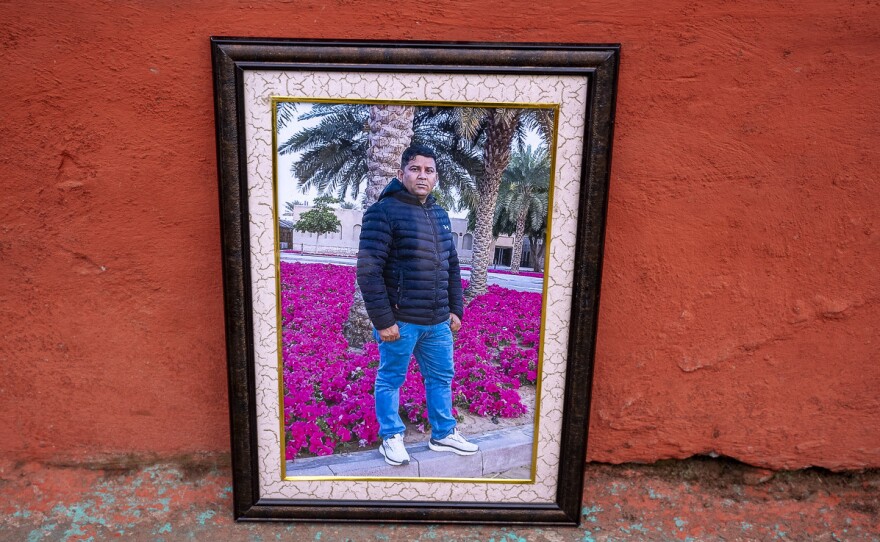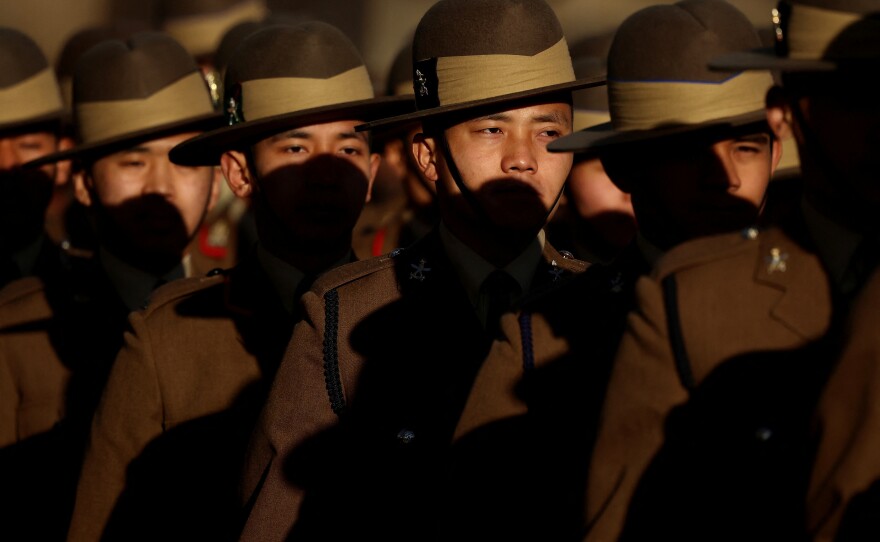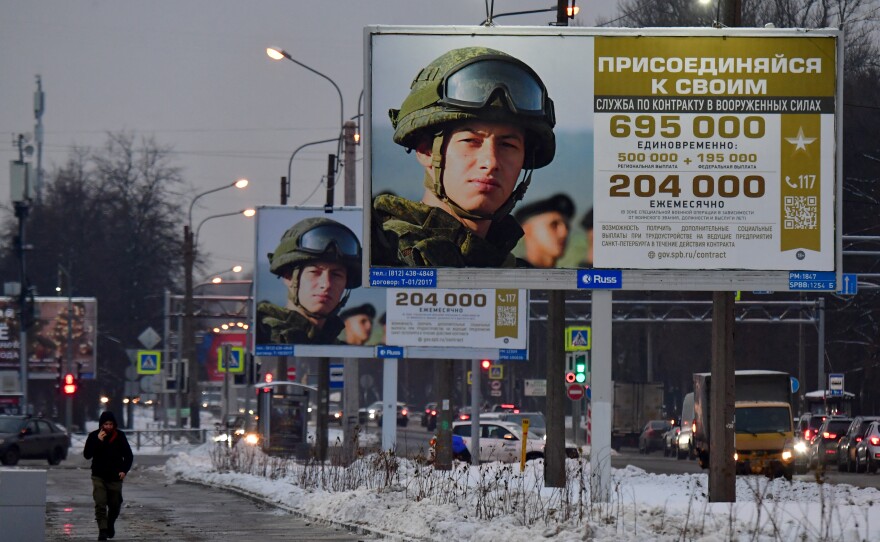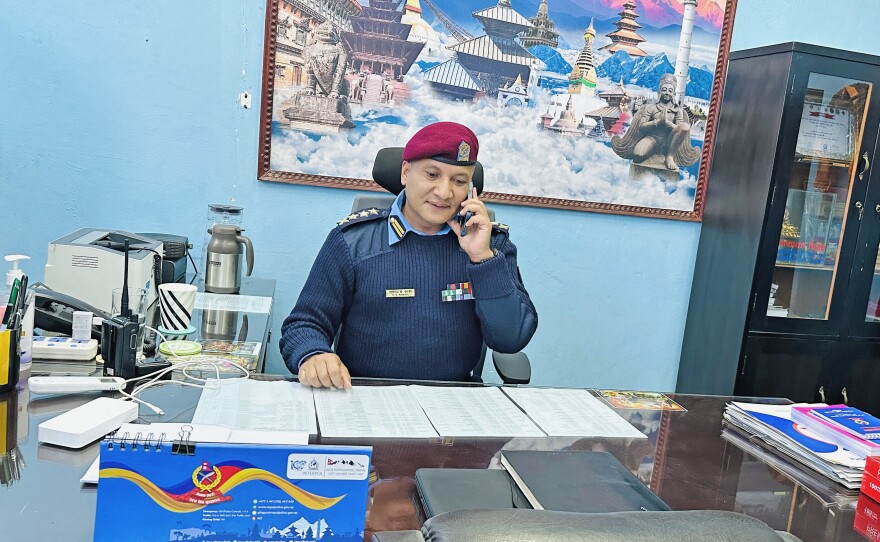SYANGJA DISTRICT, Nepal — Reema Karki is angry, but she's good at hiding it with a stoic look on her face.
The 31-year-old woman from Nepal received a letter from the Nepalese Embassy in Moscow with news that her husband, Pritam Karki, had died on Nov. 15 while serving in the Russian military in Ukraine.
Thousands of miles away from their village in the Syangja district of Nepal, her husband used to send her texts and voice messages on the Telegram messaging app every two weeks. But the communication had gone silent.

In his last voice message, Pritam said he was in Russia, away from the front, and tried to reassure her: "My dear wife, this country is huge. It's risky on the front line, but I'm not there, so it's all good. It's just a matter of one year. After that, we will have a citizenship card and you can move here with me."
He was referring to the Russian government's offer of citizenship to foreigners after one year of serving in its army on a contractual basis.
He was one of hundreds of Nepali men Russia has recruited to bolster its military forces in nearly three years of war against Ukraine. Now, after some of them have died or disappeared, Nepal's government says it's taking steps to prevent citizens from going and urging Russia to send back the country's men.
"I didn't know much about the situation in Russia," Reema Karki tells NPR, saying her husband kept details from her.
"He never told me stories of war, never told me about the hardships he faced there. He used to say he is safe there. Had I known about the war, I would have never let him go," she says. "Only after I heard the news [of his death], I could sense that he was hiding things from me."
He said he was off to Afghanistan
Reema and Pritam Karki had been married for 15 years and had two sons.
A seasoned soldier, 40-year-old Pritam had served in the Nepali army for 16 years before going to Afghanistan to work as a security guard at a U.S. base in 2020, according to his uncle.
When he returned home three years later, Nepal was in the midst of an economic crisis with rising inflation and falling tourism. With no work opportunity there, he paid a broker in Kathmandu in October of last year to get him to Russia.
Before leaving, he told his mother he was going to Kathmandu to renew his visa for Afghanistan. He had actually flown to Moscow and called her later to say that he had landed in Russia for a new job.
"He was my only son," says his mother, Indira Kumari. "Our future is dark now."
Pritam's uncle, Chitra Bahadur, suspects Pritam was deceived by recruiters in Nepal's capital city.
"The agents duped him by telling him that his role in the Russian army would be similar to what he did in Afghanistan," Bahadur says. "Pritam was smart and he had been in the army. He knew what war meant. He wouldn't have gone there had he known that he would be sent to the front line to fight."
Russia makes an enticing offer
Nepal's citizens have served security duties in Afghanistan and other parts of the world. Nepal's soldiers, known as Gurkhas, have long served in foreign forces, such as the British and Indian militaries. But Nepal says it has no treaty with Russia for Gurkhas to serve there.

Nevertheless, Nepal's Foreign Ministry estimates 400 of its citizens have gone to serve in the Russian army. Nepali fighters in Russia interviewed by NPR believe the total is more than 1,000.
Russia has been luring them with offers of Russian citizenship and salaries of about 300,000 Nepali rupees ($2,260) a month, while providing little clarity about what their roles would be, the Nepali fighters say.
The deal is appealing to some men in Nepal, where typical wages are much lower than that and unemployment hovers around 11%, according to the World Bank's latest estimate in 2022.
This provided fertile ground for smugglers to exact thousands of dollars from men to send them to Russia, via Dubai and India.
Pritam's mother, Kumari, calls it a trap and blames the Russian government for sending her son to his death.
"[The] Russian government should have kept their army in the front line of battle, and not our men. If we had known about the situation, we would have tried our best to bring Pritam back home alive. We would have begged or done everything in our power to make ends meet. We would have rescued him," she says.

Not only were they unable to bring him home alive, but also to get his remains back from Russia.
The Nepalese Embassy sent the family a death certificate, viewed by NPR, that said he had suffered "explosive trauma with damage to chest organs and left lower limb" and "injuries by shrapnel in an explosion as a result of military operations" and died in a hospital in eastern Ukraine's Donetsk region.
"We heard that his body was in pieces when he died. We would have to get DNA tests to match his body parts and spend thousands of dollars to bring his body back. We just don't have that kind of money," laments Reema.
Hopeless, they performed the ritual of Pritam's last rites on a dummy made of hay.
Nepal confirms 10 deaths, but more are suspected
Nepal's Foreign Ministry confirmed 10 Nepali men were killed in the Russia-Ukraine war and four were taken prisoner by the Ukrainian army. Police and news reports in Nepal say the casualty number could be higher.
Panic has spread among dozens of families who haven't heard from their kin in Russia for months.
Nepali Foreign Minister Narayan Prakash Saud tells NPR that, as of December, about 100 Nepali men were missing or injured in Russia.

Earlier in January, the Nepali government said it stopped giving its citizens permits needed to leave the country to work in Russia or Ukraine, according to Reuters.
Nepal's Prime Minister Pushpa Kamal Dahal says the ongoing Russia-Ukraine conflict has not affected his country's relations with Moscow. But Foreign Minister Saud says Nepal is appealing to Russia for the return of Nepali men.
"We don't have any treaty with Russia and we don't want to fight the war on behalf of Russia. We believe in peace and we believe in the U.N. Charter. So we have requested them to release our poor people," he says.
The Russian Embassy in Nepal has not responded to NPR's request for comment on the Nepali government's request. NPR requests for comment from various Ukrainian government offices went unanswered.
Saud says his government has approached the International Committee of the Red Cross to intervene.
He reminded Russia that Nepali soldiers have been a part of the British and Indian army through a trilateral pact, and no comparable agreement exists with Russia.
Contrary to international news reports, Saud denies having any information on Nepali men joining the Ukrainian army.
Nepal's fighters are sent to the front
Nepal's Gurkhas are known for their skill, courage and valor. However, the fighters interviewed say the recruits are not limited to Gurkhas. They include other Nepali men of different trades and backgrounds, and such soldierly attributes are not needed to join the Russian military.
"At the military recruitment camp, the Russian army only checks for basics like chest size, etc. They're recruiting anybody and everybody regardless of height, build or health," an injured Nepali soldier told NPR from a Russian military camp in occupied Ukraine.
He asked not to use his name for fear of reprisal by the Russian army.
"Don't come to Russia unless you want to die," he says, breaking down as he recounts the horrific circumstances in which his friends died in battle.
"I was sent to the front line twice and it's really scary out there. It's a horrific war. At the front line, it's not a defensive position. We were instructed to attack the Ukrainian posts and capture their bunkers. I lost so many fellow Nepalis in front of my eyes. I couldn't help them even as they kept crying for help," he says.
The soldier says he and a friend used to work in Dubai and decided to join the Russian army after hearing about the Kremlin's offer of citizenship and attractive pay for foreigners.
But what the army contract did not offer was equal treatment and dignity, the soldier says.

"The system is such that after being trained for about 15 days, foreigners like us who join the Russian army are sent to the front line to fight. Local army men are not sent up there. We were accompanied by a few Russian criminals who were out of prisons," he says.
He tells NPR that foreign soldiers are treated as disposable by the Russian army commanders.
"I feel that the Russian government doesn't value the lives of foreign soldiers at all. For one Nepali that dies in the war, they can raise another 10. Poverty is pushing people from different countries to join the Russian army for money. And the Russian government is taking as many as it can."
Foreign fighters in Russia say men from China, India, Japan, Kazakhstan, Uzbekistan, Tajikistan and Belarus also have joined the Russian military, as have men from Ukraine and occupied territories like Crimea who support Russian President Vladimir Putin. The soldiers say Nepali fighters make up the largest foreign contingent.
Some of the soldiers tell NPR on condition of anonymity that they have ended their contract with the Russian army and are waiting for their paperwork to be processed.
But most say they're not sure how to go about it.
The unnamed Nepali soldier says Russia is keeping a close watch on its foreign troops, especially after three Nepali men managed to escape a camp in December.
Nepal arrests local recruiters
Police in Nepal say they believe the recruits were duped by brokers in Nepal who told them that they would be hired as helpers, not fighters, in the Russian army.

"Most of them paid smugglers $7,000 to $8,000 — some paid over $12,000 — to get to Russia. They didn't know the reality of what is going on in the field," Senior Superintendent of Police Bhupendra Khatri tells NPR. "The reality is that many of them died in bombarding and gunshots. They found their friends' dead bodies hither and thither. It's a very pathetic situation out there."
In recent crackdowns on local brokers, Nepali authorities have arrested 18 people accused of human trafficking in some cases and forgery in others, according to the Kathmandu district police.
Generations of Nepalis have fought for other countries in combat or served other security duties. But Nepal faces a new crisis with the Ukraine war.
The government is appealing to young people to not leave for Russia and give their country a chance.
"Our government is prioritizing employment for the youth of the country. Nepal has a bright future. We have so much potential in the hydropower, agriculture and tourism sector. We will come out of the economic crisis soon and the country will move forward. Within a few years, the pressures of going outside for a job won't exist," says Saud, the foreign minister.
But the assurance is too little too late for the injured Nepali soldier at a Russian military camp in occupied Ukraine.
Petrified at the possibility of being sent back to the front, he pleads, "Help me, I'm trapped here."
Copyright 2024 NPR. To see more, visit https://www.npr.org. 9(MDAzMjM2NDYzMDEyMzc1Njk5NjAxNzY3OQ001))






